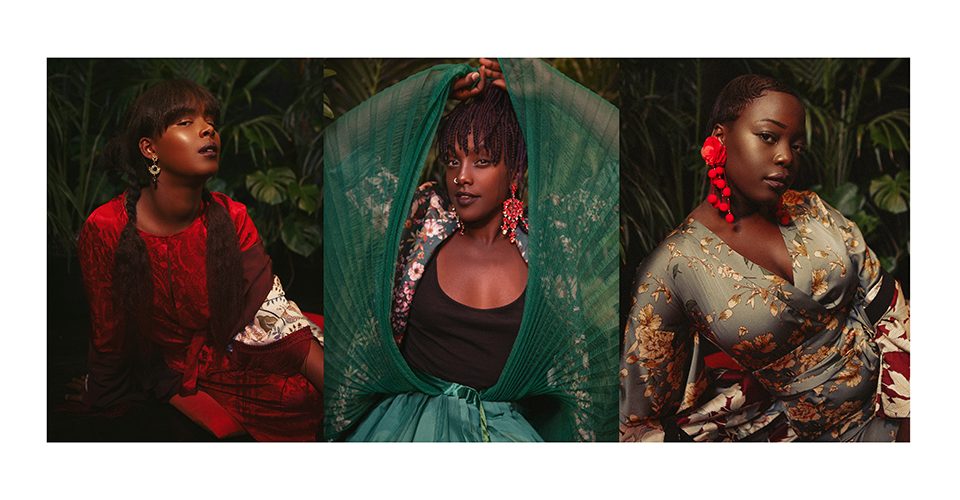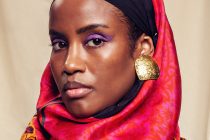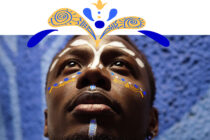SVARET / THE ANSWER is a dance and theatrical performance piece exploring three black women’s journey to free themselves from both their inner beliefs and the limiting effects of the outside world’s power structure. Directed by Ayesha Quraishi, the play is co-written by Quraishi, and the stars, Niki Tsappos, Imenella Mohamed and Doreen Ndagire. SVARET premiers September 8 at Kulturhuset Stadsteatern, Vällingby, Stockholm.
kärlek, respekt, sårbarhet/love, respect, vulnerability
The first thing that strikes me when I meet Imenella, Niki, Doreen and Ayesha is how incredibly humble, insightful and strong-willed they are.
Energy, Light, Force and Heart-follower. This is how the four women describe themselves when asked to choose an adjective that best represents them. They carry themselves with relaxed but determined ease, all the while making one feel a part of their group. I have the impression that I am talking to my girlfriends, or rather, my sisters about their journeys in life as women. We share laughs, concerns and visions about our futures as women, black women. We start the interview on a set decorated as a one-bedroom apartment, with four friends casually sitting on a queen-size bed, as if we are about to watch a movie and gossip while eating pop-corn.
Imenella Mohamed, undeniably a leading force within the dancehall scene, grew up in Tensta, a suburb in Stockholm, with origins from Somalia. “I am a Third Culture Kid” she says. “I am a professional dancer with a background in Dancehall as performing art. I’ve participated in several competitions and am also managing the feminist collective group called Unruly Gang” she adds. What she modestly fails to divulge is that she in 2012 was named the Dancehall Queen of Sweden.
Niki Tsappos was born in Ethiopia but grew up in Sweden. “I have been dancing since a very young age and always had it as an outlet, as a close friend. I have tried different styles but Hip-Hop is my foundation. I also teach dance classes and organize dance events”. Similar to Imenella, Niki does not mention that she is the first female to ever win the prestigious street dance competition “Juste Debout” in 2010, as Ayesha reveals. “She also spreads an incredibly energy everywhere”.
Doreen Ndagire, the youngest of the group, but nonetheless wise and perceptive, grew up in Tensta as well, or as she unwittingly and amusingly describes it “I was born in Sweden but I grew up in Tensta-Rinkeby”. She has been a singer since her late teens. ”I am freelancer, I do studio recording jobs, sing in a back-up choir, in addition to being a song-writer. I have also been involved in a performance called “Verkligen” that deals with the issue of hate crimes”
Ayesha Quraishi, who holds the position of Artistic Director for Kulturhuset Stadsteatern Vällingby, makes her directorial debut with “Svaret”. She describes herself as a creator and all around artist. “I always end up in different creative processes and find it interesting to be part of new ones. There is a certain kind of rawness that comes out of it and it is very exciting because it entails not following the traditional rules within the arts. I think I have done just that it in every endeavor I’ve taken throughout my work – break the conventional rules”.
What has inspired you the most in your careers and what has influenced you to achieve your goals?
“My mother” says Imenella. “She is an artist and went after her dream in a country where it was not necessarily always accepted. Nevertheless, I think it is important to be your own inspiration. So I would say my mother as well as myself”.
“The lack of role models that looked like me. That were interested in the same thing as me” says Niki. “The options were very limited in Sweden within the field of Hip-Hop so I had to search for myself. I was very selective in what I wanted to engage myself in despite my young age. It drove me to go beyond my own self-expectations and limits. I had to find myself. It’s helped me to grow and discover new aspects of myself. Today there are a lot different sources of inspiration to find everywhere. That was not the case while I was growing up”.
As for Doreen she explains that it is her choir that has inspired her the most. “I have found solace that has given me enough self-esteem to work with music full-time. This wouldn’t have happened otherwise. I started singing in my late teens. In high school we had a competition that I participated in and it felt good to be on stage, so I applied to join the choir. What drove me was the idea of proving myself wrong when feeling insecure, it made me feel that I could take on any challenge as long as I set my mind into it. Kärlek, respekt, sårbarhet/Love, respect, vulnerability.
“For me it was my parents’ background. My mother came from a village, Manyana, in Botswana while my father came from the city of Hyderabad, India. I was enthused by this duality that I call “Manyan-Abad”, a concoction of the two place names. The songs, music, and dance from the countryside, matched with the academic, free, ambitious world of the city, made me curious about the world out there, as they were so different. Already as a child I started to ask so many questions about the world, deriving from my own, international, experience when traveling with my parents. Why was it built the way it was? Why did some people have running water while others did not? However, Manyan-Abad is also a celebration of life. Growing up, home was a place of festivities with a lot of music, dancing, theater – a celebration of life. With time, I also discovered hip-hop. Hip-hop was my life. I found a platform where I could express myself as well as all my questions. There is so much you can do with hip-hop. It goes beyond the poetry and activism, you can also be entrepreneurial”.
How did the collaboration for the theatrical performance “Svaret” come to life?
“Very organically” says Ayesha. In my new position as Artistic Director at Kulturhuset Stadsteater Vällingby, I was involved in the process of creating a new theatrical performance. I was thinking on a very big scale. Shortly after, I met Niki at a dance workshop she held for a theater group. I was immediately drawn to her energy. In our conversations we started to talk about what we could do together and the seed for “Svaret” was ingrained. I asked her if she knew any dancers and, without hesitation, she mentioned Imenella. “Imenella, she sees people. She sees people”. Merely by Niki’s description I wanted to meet Imenella. I contacted her and, already at our first meeting, it felt like I’d known her all my life. The meetings followed up with late dinners where the three of us continued to discuss and shape this idea of “Svaret”. We quickly realized that all of our talks focused on the same issues. Whiteness, blackness, hair, how it is to be a black woman in a white normative society. It was during this period that Doreen started to hang out in the facility and when we started to look for a third person, it was a no-brainer that Doreen would be that person. “Svaret” was born out of all these intimate conversations we all had together”.
“We noticed the need for us to talk. We could talk for hours, sometimes until 05:00 AM. After several discussions, we still had a lot to talk about. We realized that there were many things left unsaid. Things we had all gone through in our lives that we were unable to articulate expressively. We understood that if we felt like this, surely many other women must feel the same. We talked about things that we would have told our 14 year-old selves. We also realized that a lot of the answers was among us. Things that we didn’t occur to us that another person had the ability to articulate. It is inevitable to ask those questions. If more women had these conversation, we can change the world” says Niki.
“What is important to note that we are not preaching to be “woke” and explain to others how they should live their lives. We are sharing our own real-life experiences, which makes it easier to relate to. A lot of people who have found their “woke-ness” have a tendency to give a sermon to others. We do not do that”, says Doreen.
What have you enjoyed and found challenging while working on the creation of “Svaret”?
“It was a very challenging experience to dig deep within ourselves, in places we thought we had locked and sealed. We had to persistently push ourselves to continue the search and not be fearful of the outcome. To find the truth and accept it is painful and perplexing. Nevertheless is has been extremely comforting and rewarding to have these difficult conversations. At times when I experienced racist encounters I found solace in simply looking at pictures of you ladies”, says Ayesha. “Then I felt that I was in a safe space. These conversations made us realized not only how much racism had affected us, but also dictated us. More importantly, we realized how little we knew about the full extent to which this phenomena could actually mark us as it is still prevailing in society. What would happened if we re-wrote history? If we started to tell the true stories?”
“Svaret” narrates the journey black women travel with the aim of decolonizing themselves spiritually, mentally and physically in order to find self-liberation. What questions are asked throughout this journey and how do you envision liberation?
We ask ourselves questions that have not been answered previously. Those hidden question that we do not dare to articulate out loud. We explore and talk about the underlying mechanism of racism. If everyone would ask these questions, imagine how it would affect us, change us. We always look for the answers elsewhere, as for example in textbooks, but we realized we have to take ownership over our own stories, we should write our own history. Get away from this “neocolonialism-thinking”. We will find the answer in self-love and understanding.
As prominent black female artists, particularly in the world of hip-hop and dancehall that has at times been criticized as being misogynistic, how do you reclaim your own voice and identity as well as live beyond labels put on you?
“In hip-hop you have to represent your own style and simply go for it. You need to focus and embrace your own individuality with poise” says Niki. Imenella adds, “It’s important to start from yourself as well. I have to do it for Unruly Ghal. I have to be strong and a good role-model. I no longer worry about what people have to say, on the contrary I can walk into a room with confidence. I’ve stopped putting myself down and am positive that it is going to be alright”. The others agree and Ayesha adds “It’s important to include more girls, it is imperative to give them the opportunity to train but also to fail, so that this anxiousness about always wanting to be perfect becomes obsolete”. “Women have a tendency to always self-criticize, we have to stop doing that and create our own” says Doreen.
How do you keep yourself focused professionally all the while going through the joys and tribulations of your own personal journey while performing in “Svaret.
It is hard to distance ourselves from it as we are living it. Nevertheless we have to actively take a stance against racism and not let ourselves get submerged in the despair and negativity of it. We have to find the positive in it. “Svaret” is an amazing experience, we have to verbalize greatness, form a strategy and pick your battles wisely when fighting racism.
In “Svaret” you explore the past, present and future. With that said, who were you 5 years ago, who are you today, and where will you be in 5 years?
Imenella: “Five years ago I was insecure and not in touch with myself, my blackness. I felt somewhat lost and confused, but today I do not feel like that at all. I have accomplished a lot and I am high on life. In the future I wish to be even stronger and continue to grow as a person”.
The others agree.
“I’ve learned a lot in the school of life and feel that I’ve found myself, and can now choose where I want to channel my focus” Niki adds.
“ I have been able to challenge myself by taking on new endeavors I didn’t think I could do. Now I want to continue to do that and take the cultural world by storm!” Doreen
Ayesha says “I have had a lot of privilege in my life, and in the future I want to focus on giving back and opening doors for others through giving them power to create. I want to pave the way for the new generation”.
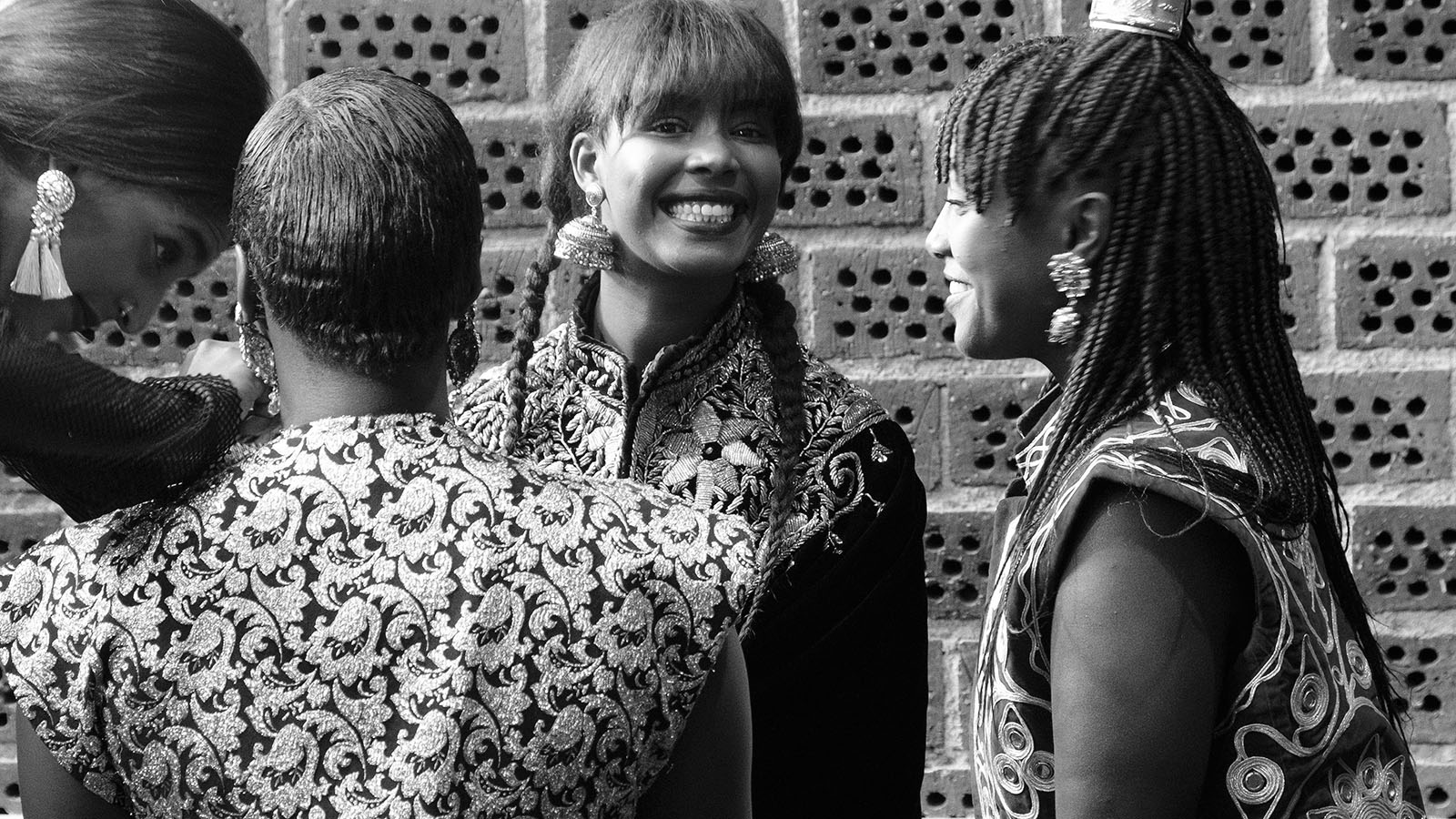
Doreen Ndagire (second left), Imenella Mohamed (middle) and Niki Tsappos (right) backstage with Costume Designer Ellen Elias (far left)
interview ESPÉRANCE BO
photos PAUL EDWARD MUSOKE
styling ELLEN ELIAS
backstage photos ANDREA DAVIS KRONLUND
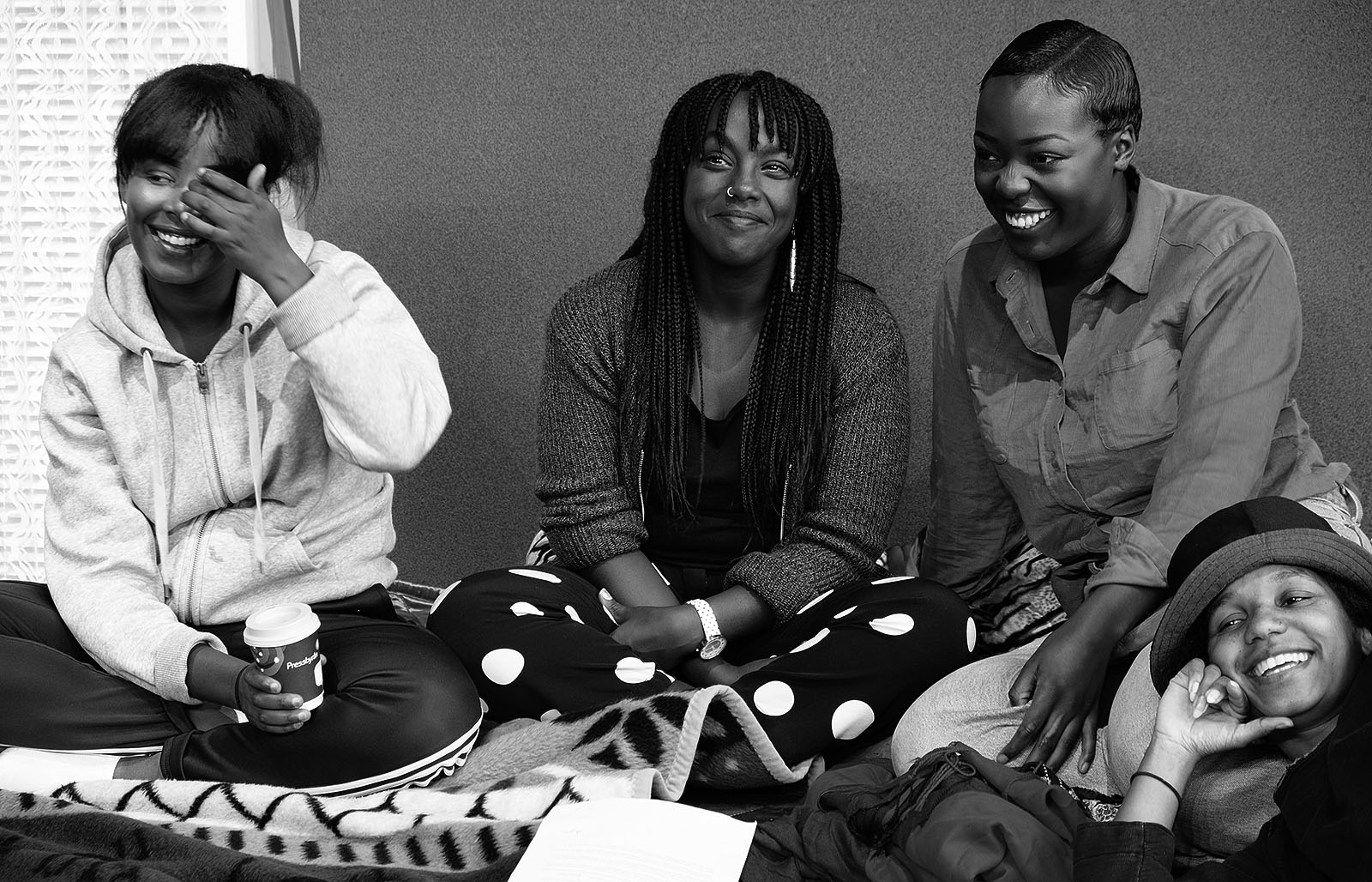
Imenella, Niki, Doreen and Ayesha telling it like it is on set at Kulturhuset Stadsteatern Vällingby

